频度副词用法总结
- 格式:doc
- 大小:54.50 KB
- 文档页数:5
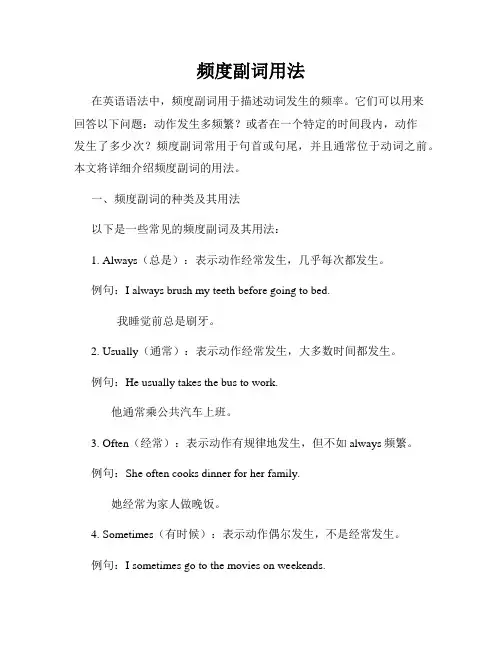
频度副词用法在英语语法中,频度副词用于描述动词发生的频率。
它们可以用来回答以下问题:动作发生多频繁?或者在一个特定的时间段内,动作发生了多少次?频度副词常用于句首或句尾,并且通常位于动词之前。
本文将详细介绍频度副词的用法。
一、频度副词的种类及其用法以下是一些常见的频度副词及其用法:1. Always(总是):表示动作经常发生,几乎每次都发生。
例句:I always brush my teeth before going to bed.我睡觉前总是刷牙。
2. Usually(通常):表示动作经常发生,大多数时间都发生。
例句:He usually takes the bus to work.他通常乘公共汽车上班。
3. Often(经常):表示动作有规律地发生,但不如always频繁。
例句:She often cooks dinner for her family.她经常为家人做晚饭。
4. Sometimes(有时候):表示动作偶尔发生,不是经常发生。
例句:I sometimes go to the movies on weekends.我有时候在周末去看电影。
5. Rarely(很少):表示动作发生的频率非常低,几乎不发生。
例句:They rarely go on vacation.他们很少去度假。
6. Never(从不):表示动作从未发生过。
例句:I never eat fast food.我从不吃快餐。
二、频度副词的位置频度副词通常放在一般动词前面,但放在助动词、情态动词或be 动词之后。
例句:I always wake up early.我总是早起。
She can rarely finish her homework on time.她几乎从不能按时完成作业。
对于句子的否定形式,频度副词通常放在助动词之后,但在be动词之前。
例句:He is never late for work.他上班从不迟到。
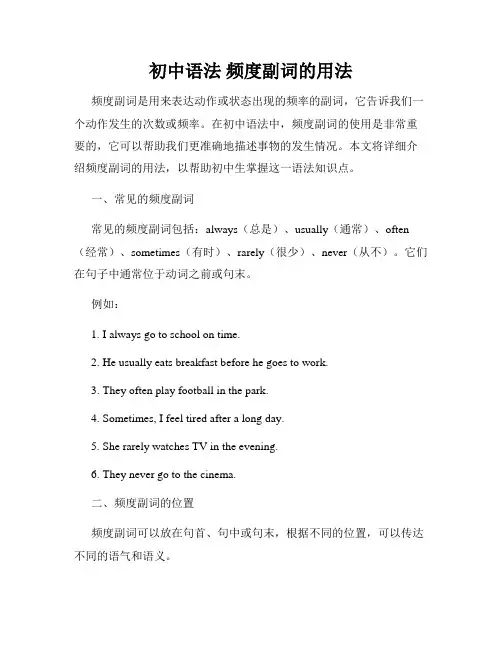
初中语法频度副词的用法频度副词是用来表达动作或状态出现的频率的副词,它告诉我们一个动作发生的次数或频率。
在初中语法中,频度副词的使用是非常重要的,它可以帮助我们更准确地描述事物的发生情况。
本文将详细介绍频度副词的用法,以帮助初中生掌握这一语法知识点。
一、常见的频度副词常见的频度副词包括:always(总是)、usually(通常)、often (经常)、sometimes(有时)、rarely(很少)、never(从不)。
它们在句子中通常位于动词之前或句末。
例如:1. I always go to school on time.2. He usually eats breakfast before he goes to work.3. They often play football in the park.4. Sometimes, I feel tired after a long day.5. She rarely watches TV in the evening.6. They never go to the cinema.二、频度副词的位置频度副词可以放在句首、句中或句末,根据不同的位置,可以传达不同的语气和语义。
1. 句首位置:当频度副词放在句首时,强调的是频度副词本身。
例如:Always, he gets up early in the morning.Usually, she goes to bed at 10 p.m.2. 句中位置:当频度副词放在句中时,通常位于be动词或助动词之后,或者在情态动词之前。
例如:I am always happy to see you.She can usually solve the math problems.They have often traveled to different countries.3. 句末位置:当频度副词放在句末时,强调的是动作本身。
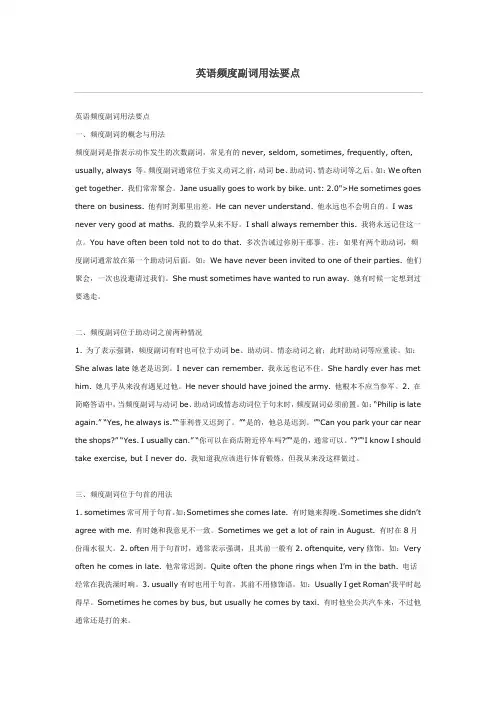
英语频度副词用法要点一、频度副词的概念与用法频度副词是指表示动作发生的次数副词,常见有的never, seldom, sometimes, frequently, often, usually, always 等。
频度副词通常位于实义动词之前,动词be、助动词、情态动词等之后。
如:We often get together. 我们常常聚会。
Jane usually goes to work by bike. unt: 2.0">He sometimes goes there on business. 他有时到那里出差。
He can never understand. 他永远也不会明白的。
I was never very good at maths. 我的数学从来不好。
I shall always remember this. 我将永远记住这一点。
You have often been told not to do that. 多次告诫过你别干那事。
注:如果有两个助动词,频度副词通常放在第一个助动词后面。
如:We have never been invited to one of their parties. 他们聚会,一次也没邀请过我们。
She must sometimes have wanted to run away. 她有时候一定想到过要逃走。
二、频度副词位于助动词之前两种情况1. 为了表示强调,频度副词有时也可位于动词be、助动词、情态动词之前;此时助动词等应重读。
如:She alwas late她老是迟到。
I never can remember. 我永远也记不住。
She hardly ever has met him. 她几乎从来没有遇见过他。
He never should have joined the army. 他根本不应当参军。
2. 在简略答语中,当频度副词与动词be、助动词或情态动词位于句末时,频度副词必须前置。
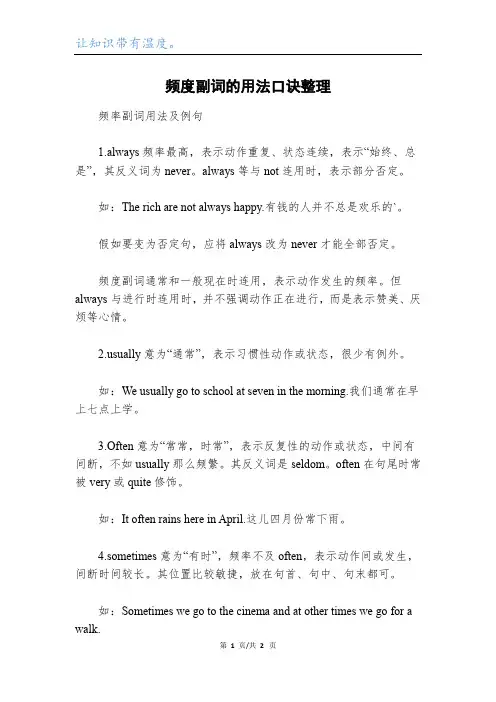
让知识带有温度。
频度副词的用法口诀整理频率副词用法及例句1.always频率最高,表示动作重复、状态连续,表示“始终、总是”,其反义词为never。
always等与not连用时,表示部分否定。
如:The rich are not always happy.有钱的人并不总是欢乐的`。
假如要变为否定句,应将always改为never才能全部否定。
频度副词通常和一般现在时连用,表示动作发生的频率。
但always与进行时连用时,并不强调动作正在进行,而是表示赞美、厌烦等心情。
ually意为“通常”,表示习惯性动作或状态,很少有例外。
如:We usually go to school at seven in the morning.我们通常在早上七点上学。
3.Often意为“常常,时常”,表示反复性的动作或状态,中间有间断,不如usually那么频繁。
其反义词是seldom。
often在句尾时常被very或quite修饰。
如:It often rains here in April.这儿四月份常下雨。
4.sometimes意为“有时”,频率不及often,表示动作间或发生,间断时间较长。
其位置比较敏捷,放在句首、句中、句末都可。
如:Sometimes we go to the cinema and at other times we go for a walk.第1页/共2页千里之行,始于足下。
有时我们去看电影,有时我们去漫步。
5.seldom意为“很少”,这个副词表示否定意义,动作几乎不会发生。
如:He seldom eats breakfast.他很少吃早餐。
hardly具有否定意义,表示“几乎不、简直不”,除非特别状况,否则不会发生。
如:The boy is so young that he could hardly understand it.这个孩子太小了,不行能懂得这件事。
6.never意为“从不”表示动作不会发生。
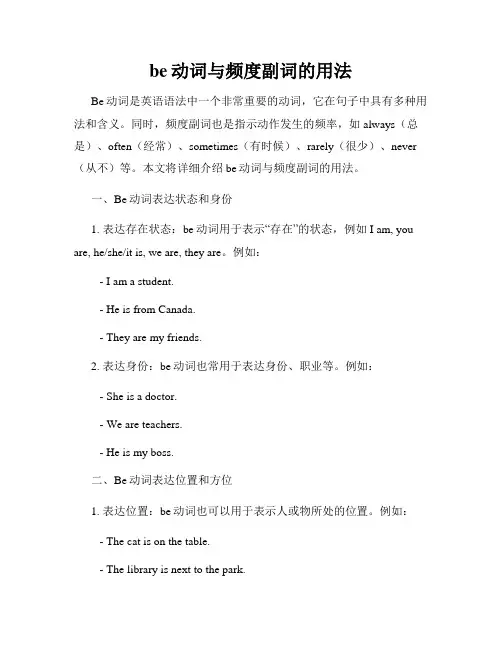
be动词与频度副词的用法Be动词是英语语法中一个非常重要的动词,它在句子中具有多种用法和含义。
同时,频度副词也是指示动作发生的频率,如always(总是)、often(经常)、sometimes(有时候)、rarely(很少)、never (从不)等。
本文将详细介绍be动词与频度副词的用法。
一、Be动词表达状态和身份1. 表达存在状态:be动词用于表示“存在”的状态,例如I am, you are, he/she/it is, we are, they are。
例如:- I am a student.- He is from Canada.- They are my friends.2. 表达身份:be动词也常用于表达身份、职业等。
例如:- She is a doctor.- We are teachers.- He is my boss.二、Be动词表达位置和方位1. 表达位置:be动词也可以用于表示人或物所处的位置。
例如:- The cat is on the table.- The library is next to the park.- The book is under the chair.2. 表达方位:be动词还能表达方位,指示一个物体朝着某个方向。
例如:- The car is driving towards the city.- The birds are flying south for the winter.- The river is flowing east.三、Be动词表达时间和日期1. 表达时间:be动词也可以用于表达时间。
例如:- It is 8 o'clock.- Today is Monday.- The party is on Saturday.2. 表达日期:be动词可以用于表达日期。
例如:- The conference is on January 15th.- The concert is in December.- The deadline is next week.四、Be动词表达情感和状态1. 表达情感:be动词还可以表达情感和感受。

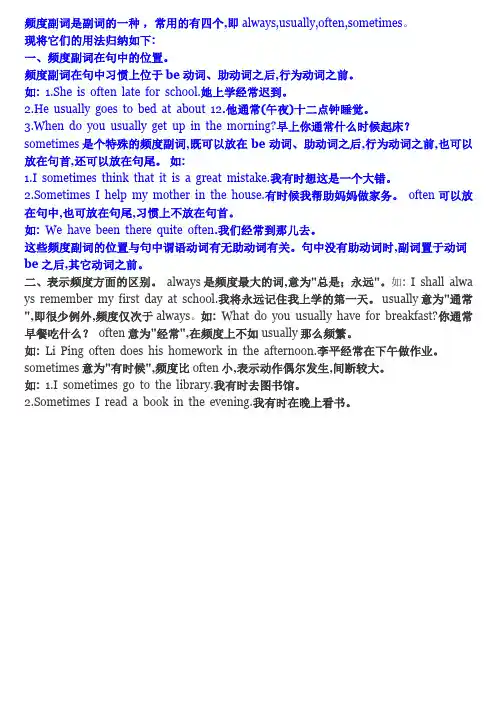
频度副词是副词的一种,常用的有四个,即always,usually,often,sometimes。
现将它们的用法归纳如下:一、频度副词在句中的位置。
频度副词在句中习惯上位于be动词、助动词之后,行为动词之前。
如:1.She is often late for school.她上学经常迟到。
2.He usually goes to bed at about 12.他通常(午夜)十二点钟睡觉。
3.When do you usually get up in the morning?早上你通常什么时候起床?sometimes是个特殊的频度副词,既可以放在be动词、助动词之后,行为动词之前,也可以放在句首,还可以放在句尾。
如:1.I sometimes think that it is a great mistake.我有时想这是一个大错。
2.Sometimes I help my mother in the house.有时候我帮助妈妈做家务。
often可以放在句中,也可放在句尾,习惯上不放在句首。
如:We have been there quite often.我们经常到那儿去。
这些频度副词的位置与句中谓语动词有无助动词有关。
句中没有助动词时,副词置于动词be之后,其它动词之前。
二、表示频度方面的区别。
always是频度最大的词,意为"总是;永远"。
如: I shall alwa ys remember my first day at school.我将永远记住我上学的第一天。
usually意为"通常",即很少例外,频度仅次于always。
如:What do you usually have for breakfast?你通常早餐吃什么?often意为"经常",在频度上不如usually那么频繁。
如:Li Ping often does his homework in the afternoon.李平经常在下午做作业。
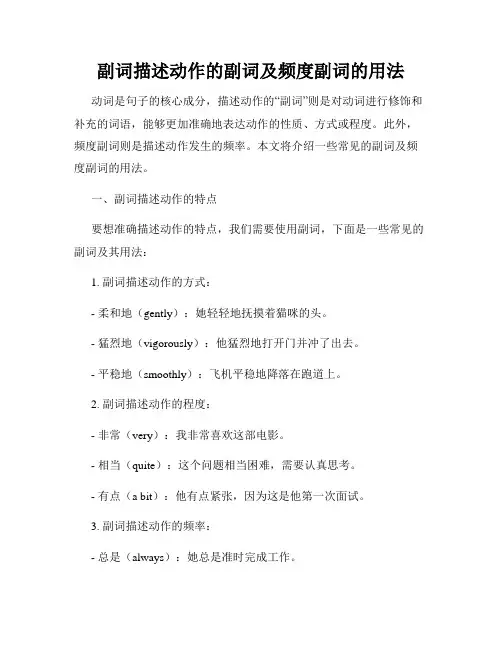
副词描述动作的副词及频度副词的用法动词是句子的核心成分,描述动作的“副词”则是对动词进行修饰和补充的词语,能够更加准确地表达动作的性质、方式或程度。
此外,频度副词则是描述动作发生的频率。
本文将介绍一些常见的副词及频度副词的用法。
一、副词描述动作的特点要想准确描述动作的特点,我们需要使用副词,下面是一些常见的副词及其用法:1. 副词描述动作的方式:- 柔和地(gently):她轻轻地抚摸着猫咪的头。
- 猛烈地(vigorously):他猛烈地打开门并冲了出去。
- 平稳地(smoothly):飞机平稳地降落在跑道上。
2. 副词描述动作的程度:- 非常(very):我非常喜欢这部电影。
- 相当(quite):这个问题相当困难,需要认真思考。
- 有点(a bit):他有点紧张,因为这是他第一次面试。
3. 副词描述动作的频率:- 总是(always):她总是准时完成工作。
- 经常(often):我经常去图书馆借书。
- 偶尔(occasionally):他偶尔会在周末去爬山。
二、频度副词的用法频度副词用于描述动作发生的频率,常放在句子的中间位置或句尾。
下面是一些常见的频度副词及其用法:1. 总是(always):表示动作经常发生,不受时间限制。
例如:她总是早上六点起床。
2. 经常(often):表示动作经常发生,在总体时间范围内会多次出现。
例如:我经常和朋友一起去看电影。
3. 常常(frequently):表示动作频繁地发生,但程度不及“经常”。
例如:他常常去那家餐厅吃晚饭。
4. 有时候(sometimes):表示动作偶尔发生,不太频繁。
例如:我有时候会在周末去郊游。
5. 偶尔(occasionally):表示动作发生的概率很小,很少发生。
例如:她偶尔会去看一些展览。
6. 很少(rarely):表示动作发生的概率很小,几乎不发生。
例如:我很少熬夜。
7. 从不(never):表示动作从未发生。
例如:他从不吸烟。
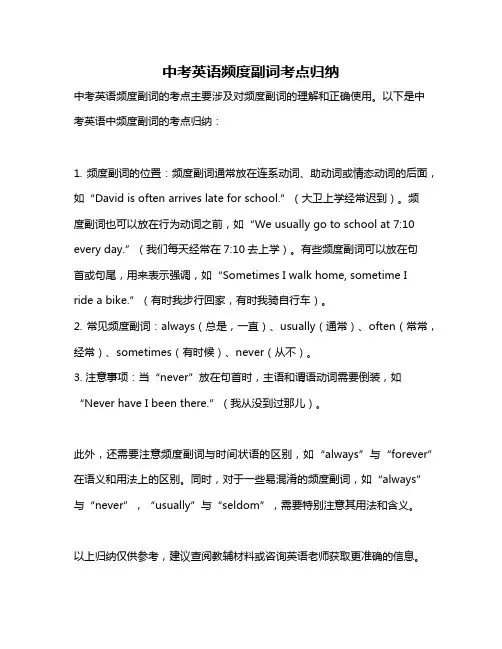
中考英语频度副词考点归纳
中考英语频度副词的考点主要涉及对频度副词的理解和正确使用。
以下是中考英语中频度副词的考点归纳:
1. 频度副词的位置:频度副词通常放在连系动词、助动词或情态动词的后面,如“David is often arrives late for school.”(大卫上学经常迟到)。
频
度副词也可以放在行为动词之前,如“We usually go to school at 7:10 every day.”(我们每天经常在7:10去上学)。
有些频度副词可以放在句
首或句尾,用来表示强调,如“Sometimes I walk home, sometime I
ride a bike.”(有时我步行回家,有时我骑自行车)。
2. 常见频度副词:always(总是,一直)、usually(通常)、often(常常,经常)、sometimes(有时候)、never(从不)。
3. 注意事项:当“never”放在句首时,主语和谓语动词需要倒装,如“Never have I been there.”(我从没到过那儿)。
此外,还需要注意频度副词与时间状语的区别,如“always”与“forever”在语义和用法上的区别。
同时,对于一些易混淆的频度副词,如“always”与“never”,“usually”与“seldom”,需要特别注意其用法和含义。
以上归纳仅供参考,建议查阅教辅材料或咨询英语老师获取更准确的信息。
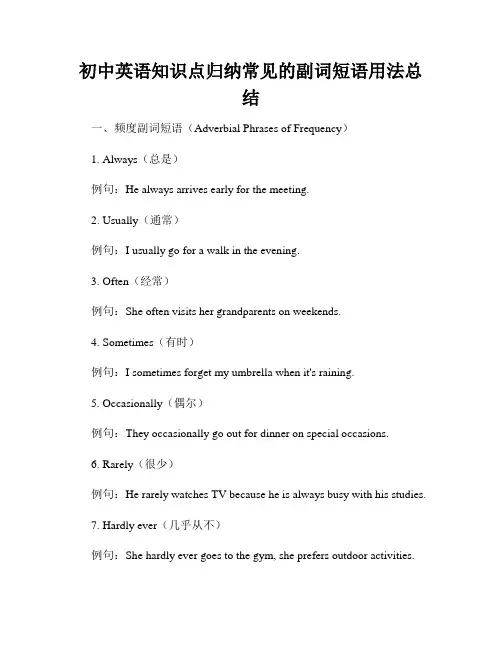
初中英语知识点归纳常见的副词短语用法总结一、频度副词短语(Adverbial Phrases of Frequency)1. Always(总是)例句:He always arrives early for the meeting.2. Usually(通常)例句:I usually go for a walk in the evening.3. Often(经常)例句:She often visits her grandparents on weekends.4. Sometimes(有时)例句:I sometimes forget my umbrella when it's raining.5. Occasionally(偶尔)例句:They occasionally go out for dinner on special occasions.6. Rarely(很少)例句:He rarely watches TV because he is always busy with his studies.7. Hardly ever(几乎从不)例句:She hardly ever goes to the gym, she prefers outdoor activities.8. Never(从不)例句:They never miss a chance to travel during summer vacation.二、时间副词短语(Adverbial Phrases of Time)1. In the morning/afternoon/evening(在早晨/下午/晚上)例句:I exercise in the morning before going to work.2. On weekdays/weekends(在工作日/周末)例句:I have to work on weekdays but I relax on weekends.3. At night(在晚上)例句:They like to stargaze at night in their backyard.4. By the end of(到...结束)例句:She will finish her project by the end of next week.5. In the meantime(与此同时)例句:While waiting for the bus, he read a book in the meantime.6. At the same time(同时)例句:They arrived at the party at the same time.7. From time to time(时常)例句:He visits his grandparents from time to time.8. All day/night long(整天/整晚)例句:They were dancing all night long at the party.三、地点副词短语(Adverbial Phrases of Place)1. In the park(在公园)例句:They often have picnics in the park on weekends.2. At school(在学校)例句:I met my friends at school during lunch break.3. On the beach(在海滩)例句:They love swimming and sunbathing on the beach.4. In the city/countryside(在城市/农村)例句:She enjoys the tranquility of living in the countryside.5. At home(在家)例句:He spends most of his weekends at home with his family. 6. On the way(在路上)例句:They had a great conversation on the way to the airport. 7. Across the road(在马路对面)例句:The supermarket is just across the road, it's very convenient.四、方式副词短语(Adverbial Phrases of Manner)1. In a hurry(匆忙地)例句:She left the house in a hurry because she was late for work.2. With pleasure(乐意地)例句:I will help you move next week, with pleasure.3. In a loud voice(大声地)例句:He shouted in a loud voice to get the attention of the audience.4. On purpose(故意地)例句:He spilled the drink on purpose to annoy his sister.5. By accident(偶然地)例句:I found this lost wallet by accident while walking in the park.6. In a funny way(滑稽地)例句:He imitates his teacher in a funny way and makes everyone laugh.7. In a serious manner(严肃地)例句:The teacher spoke to the students in a serious manner about their behavior.总结:副词短语在英语中起到修饰动词、形容词、副词和整个句子的作用,能够更准确地表达出时间、地点、方式和频率等信息。
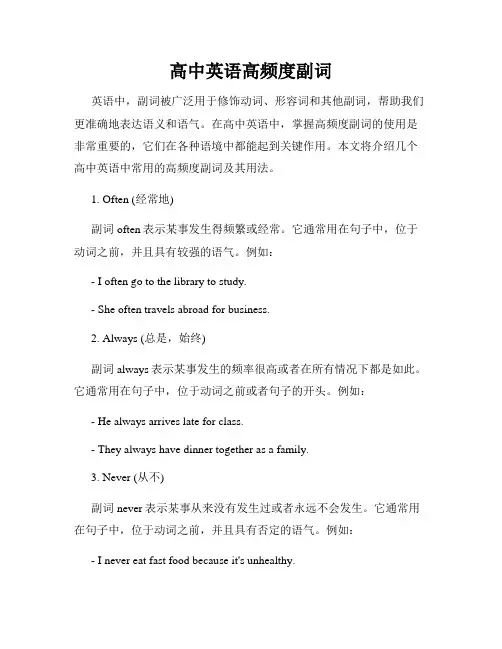
高中英语高频度副词英语中,副词被广泛用于修饰动词、形容词和其他副词,帮助我们更准确地表达语义和语气。
在高中英语中,掌握高频度副词的使用是非常重要的,它们在各种语境中都能起到关键作用。
本文将介绍几个高中英语中常用的高频度副词及其用法。
1. Often (经常地)副词often表示某事发生得频繁或经常。
它通常用在句子中,位于动词之前,并且具有较强的语气。
例如:- I often go to the library to study.- She often travels abroad for business.2. Always (总是,始终)副词always表示某事发生的频率很高或者在所有情况下都是如此。
它通常用在句子中,位于动词之前或者句子的开头。
例如:- He always arrives late for class.- They always have dinner together as a family.3. Never (从不)副词never表示某事从来没有发生过或者永远不会发生。
它通常用在句子中,位于动词之前,并且具有否定的语气。
例如:- I never eat fast food because it's unhealthy.- She never forgets her friends' birthdays.4. Sometimes (有时候)副词sometimes表示某事发生时有时候,但不是经常。
它通常用在句子中,位于动词之前。
例如:- I sometimes go for a run in the morning.- They sometimes have parties on weekends.5. Occasionally (偶尔)副词occasionally表示某事时不时地发生,但并不经常。
它通常用在句子中,位于动词之前。
例如:- I occasionally go to the theater to watch movies.- She occasionally volunteers at the local charity.6. Rarely (很少)副词rarely表示某事发生的次数很少或者几乎没有。
频度副词知识点总结频度副词是用来表示动作发生的频率或次数的副词。
以下是关于频度副词的一些知识点总结:1.常用的频度副词:always总是,often经常,frequently频繁地,regularly有规律地,sometimes有时,seldom很少,never从不等。
2.频度副词通常放在实义动词之前,be动词或助动词之后。
例如:He often goes to the park.他经常去公园。
3.表示动作的频率或次数:频度副词可以用来表示动作发生的频率或次数,例如:I go to the gym twice a week.我每周去健身房两次。
4.表示习惯或常态:频度副词可以用来表示一种习惯或常态。
例如:They usually have dinner together.他们通常一起吃饭。
5.表示强调:频度副词可以用来强调动作的频率或次数。
例如:He always remembers my birthday.他总是记得我的生日。
6.与always连用的动词:与always连用的动词通常是持续性动词,表示动作一直发生或重复出现。
例如:I always eat breakfast in the morning.我总是早上吃早餐。
7.与never连用的动词:与never连用的动词通常是瞬间动词,表示动作只发生一次或不会发生。
例如:I never smoke.我从不抽烟。
8.与more和less连用的频度副词:频度副词可以和more和less连用,表示程度或比较级。
例如:I smoke less than before.我现在吸烟比以前少了。
9.否定形式:频度副词的否定形式是使用not+频度副词的形式。
例如:He doesn't often go out with friends.他并不经常和朋友出去玩。
英语频度副词大全汇总英语频度副词是我们学习英语的必备工具,可以帮助我们表达事件发生的频率,对于英语学习者来说,熟悉常见的频度副词是非常重要的。
以下是常见的英语频度副词大全汇总,希望对你的英语学习有所帮助。
第一步:频度副词的分类频度副词可以根据时间段的长度而分为长时间频度副词和短时间频度副词。
长时间频度副词用于描述事件在较长的时间段内发生的频率,如:1. always 总是2. usually 通常3. often 经常4. frequently 频繁地5. regularly 定期地6. seldom 很少7. rarely 很少8. hardly ever 几乎不9. never 从不短时间频度副词用于描述事件在较短的时间段内发生的频率,如:1. constantly 不断地2. consistently 一贯地,坚持不懈地3. continuously 连续不断地4. daily 每天5. hourly 每小时6. yearly 每年7. monthly 每月8. weekly 每周9. annually 每年第二步:频度副词的用法频度副词通常用于句子中的实义动词之前,如:1. I always eat breakfast before I go to work.2. He usually takes the bus to school.3. They frequently travel to England for vacations.4. We rarely go to the cinema on weekdays.频度副词也可以用于句子的开头或结尾,如:1. Always remember to lock the door before you leave.2. I usually wake up at 6 a.m. on weekdays.3. We seldom eat out because we prefer home-cooked meals.4. It never rains in southern California.注意:频度副词的位置是可以改变的,但要注意语法和句子的流畅度。
频度副词的用法及位置
1. 哎呀,频度副词一般放在行为动词前面呢!比如说“我经常去公园”,这里的“经常”就是频度副词,放在了“去”这个行为动词前,是不是很好理解呀?
2. 嘿,频度副词还可以放在 be 动词、情态动词后面呀!就像“他总是很开心”,“总是”在 be 动词“是”后面,这多明显呀!
3. 哇塞,当句子里既有行为动词又有 be 动词或情态动词的时候,频度副词要放在第一个助动词后面呢!举个例子“她有时会在周末画画”,“有时”就放在了“会”后面。
4. 大家注意哦,频度副词也能放在句首或者句尾来强调呢!比如说“经常,我都会想起那件事”或者“我去锻炼,偶尔”。
5. 咦,频度副词使用的时候也要注意语境呀!比如“我一直都喜欢看书”,这里的“一直”就突出了我对看书的喜爱程度很深。
6. 你们想想看,不同的频度副词表达的频率可不一样哦!像“总是”就比“经常”频率高,就像“他总是第一个到”和“他经常第一个到”,感觉就不一样呢!
7. 哈哈,掌握频度副词的用法和位置真的很重要呢!可以让我们的表达更加准确、生动呀!比如“她从不迟到”,“从不”就明确地表明了她的这个习惯。
总结:频度副词虽然小,但在语言表达中作用很大呢,大家一定要好好掌握呀!。
常见频度副词的用法
1. “always”,哎呀呀,就像太阳总是每天升起一样,你看我总是喜欢吃巧克力呀!比如“I always eat chocolate when I'm stressed.”(我压力大的时候总是吃巧克力。
)
2. “usually”,嘿,这就好比你通常会在周末睡个懒觉一样,我通常晚上会看会儿书呢!像“She usually goes to the park on Sundays.”(她通常在周日去公园。
)
3. “often”,哇哦,就像他经常去打球,我也经常和朋友们聚会呀!比如说“I often have parties with my friends.”(我经常和朋友们聚会。
)
4. “sometimes”,哎呀呀,有时候就像天气会突然变化,我有时候也会偷懒不想做家务呢!例如“He sometimes forgets his keys.”(他有时候会忘记带钥匙。
)
5. “rarely”,咦,这就像看到流星那样罕见,我很少吃辣的东西呢!“I rarely eat spicy food.”
6. “never”,哇塞,这就如同永远不会有两片相同的雪花,我可从来不吃榴莲呀!“I never eat durian.”
7. “seldom”,呦呵,就好比中彩票那么难得,我真的很少去酒吧呢!“She seldom goes to the bar.”
8. “occasionally”,呀,偶尔就像天空中偶尔飘过的那片彩云,我偶尔会给自己放个假去旅游呀!“I occasionally take a vacation to travel.”
我的观点结论就是:这些频度副词真的很有用呀,能让我们的表达更加准确生动呢!。
更多>> always usually often sometimes hardly ever ne ver 频度副词的用法一、频度副词的概念与用法频度副词是指表示动作发生的次数副词,常见有的never, seldom, sometimes, frequently, often, usually, always 等。
频度副词通常位于实义动词之前,动词be、助动词、情态动词等之后。
如:We often get together.我们常常聚会。
Jane usually goes to work by bike.简通常骑自行车上班。
He sometimes goes there on business.他有时到那里出差。
He can never understand.他永远也不会明白的。
I shall always remember this.我将永远记住这一点。
注:如果有两个助动词,频度副词通常放在第一个助动词后面。
We have never been invited to one of their parties.他们聚会,一次也没邀请过我们。
She must sometimes have wanted to run away.她有时候一定想到过要逃走。
二、频度副词位于助动词之前两种情况1. 为了表示强调,频度副词有时也可位于动词be、助动词、情态动词之前;此时助动词等应重读。
如:She always was late.她老是迟到。
I never can remember.我永远也记不住。
He never should have joined the army.他根本不应当参军。
2. 在简略答语中,当频度副词与动词be、助动词或情态动词位于句末时,频度副词必须前置。
如:“Philip is late again.” “Yes, he always is.”“菲利普又迟到了。
”“是的,他总是迟到。
频度副词用法总结always usually often sometimes hardly ever never 这些都是频度副词,其用法如下:一、频度副词的概念与用法频度副词是指表示动作发生的次数副词,常见有的never, seldom, sometimes, frequently, often, usually, always 等。
频度副词通常位于实义动词之前,动词be、助动词、情态动词等之后。
如:We often get together.我们常常聚会。
Jane usually goes to work by bike.简通常骑自行车上班。
He sometimes goes there on business.他有时到那里出差。
He can never understand.他永远也不会明白的。
I shall always remember this.我将永远记住这一点。
注:如果有两个助动词,频度副词通常放在第一个助动词后面。
We have never been invited to one of their parties.他们聚会,一次也没邀请过我们。
She must sometimes have wanted to run away.她有时候一定想到过要逃走。
二、频度副词位于助动词之前两种情况1. 为了表示强调,频度副词有时也可位于动词be、助动词、情态动词之前;此时助动词等应重读。
如:She always was late.她老是迟到。
I never can remember.我永远也记不住。
He never should have joined the army.他根本不应当参军。
2. 在简略答语中,当频度副词与动词be、助动词或情态动词位于句末时,频度副词必须前置。
如:“Philip is late again.” “Yes, he always is.”“菲利普又迟到了。
”“是的,他总是迟到。
”“Can you park your car near the shops?” “Yes. I usually can.”“你可以在商店附近停车吗?”“是的,通常可以。
”I know I should take exercise, but I never do.我知道我应该进行体育锻炼,但我从来没这样做过。
三、频度副词在否定句中的用法在否定句中,有的频度副词位于否定词之前或之后均可,而有的频度副词则必须位于否定词之后,而还有的频度副词却必须要位于否定词。
大致情况如下:1. 频度副词usually和often可位于否定词not之前或之后。
如:他们不常开这样的晚会。
正:They don’t often hold such parties.正:They often don’t hold such parties.星期日我们一般不在9点以前起床。
正:We don’t usually get up before nine on Sundays.正:We usually don’t get up before nine on Sundays.在否定句中,频度副词用于句中或句首,有时但会导致意思不同。
如:He doesn’t usually sleep for two days at a time.他很少一连睡两天。
Usually he doesn’t sleep for two days at a time.他连续两天不睡觉是常事。
2. 频度副词always总是位于否定词之后,不可位于否定句之前。
如:Things are not always what they seem to be.外表往往是靠不住的。
Silence must not always be read as consent.沉默并不见得一定意味着同意。
3. 频度副词sometimes总是位于否定词之前,不可位于否定词之后。
如:Jim is sometimes not very punctual.吉姆有时不太准时。
Debbie is sometimes not responsible for what she does.戴比有时对她所做的事不负责任。
四、频度副词位于句末的用法1.sometimes常可用于句末。
如:We all get into trouble sometimes.我们有时都会遇到麻烦。
You can’t work all the time—it does you good to go out and enjoy yourself sometimes.你不能总是工作,有时出去放松一下会对你有好处。
2. often有时可置于句末,但通常会带有very, quite, fairly, more, so等修饰语。
如:We’ve been there quite often.经常去那里。
When I was young, I used to play tennis very often.我年轻时经常打网球。
Diana used to travel a lot. These days she doesn’t go away so often.戴安娜过去经常旅游。
最近她不常出门了。
We’re not exactly on intimate terms, but we see each other fairly often.我们虽算不上关系密切,但还常见面。
注:有时也可不带修饰语,但主要见于否定句或疑问句。
如:He writes to me often.他经常给我写信。
Do you come here often?你常来这儿吗?I don’t come here often.我不常来这儿。
3. usually有时也用于句末,其前不用修饰语。
如:I’m not late, usually.我通常不迟到。
I get paid on Fridays usually.我通常在星期五领工资。
4. seldom 一般不用于句末,除非其前带有only, very等修饰。
如:We go out very seldom.我们绝少外出。
I play basketball very seldom indeed.我很少打篮球。
5. always一般不用于句末,偶尔用于句末,此时它不表法“总是”,而表示“永远”。
如:I’ll love you always.我将永远爱你。
另外,有时用于句末是因为句子有所省略的缘故。
如:Generally they walked together on Sunday, but not always.他们一般在星期日一起散步,但并不总是如此。
句中的but not always=but they didn’t always walk together on Sunday。
五、频度副词位于句首的用法1. sometimes常可用于句首。
如:Sometimes she comes late.有时她来得晚。
Sometimes she didn’t agree w ith me.有时她和我意见不一致。
Sometimes we get a lot of rain in August.有时在8月份雨水很大。
2. often用于句首时,通常表示强调,且其前一般有quite, very修饰。
如:Very often he comes in late.他常常迟到。
Quite often the phone rings when I’m in the bath.电话经常在我洗澡时响。
3. usually有时也用于句首,其前不用修饰语。
如:Usually I get up early.我平时起得早。
Sometimes he comes by bus, but usually he comes by taxi.有时他坐公共汽车来,不过他通常还是打的来。
Usually cooking pots have two small handles but pans have one long handle.通常地深底煮锅有两只把手而平底锅只有一个长长的把手。
4. always一般不用于句首,除非是用在祈使句中。
如:Always remember this.请时刻记住这一点。
Always look in the mirror before starting to drive.一定要先看看反光镜再开车。
另外,never也可用于祈使句的句首。
如:Never tell him the news.千万不要告诉他这消息。
Never ask her about her marriage.决不要问她结婚的事。
5. 在正式文体中,表示否定意义的副词seldom, never可位于句首,但此时其后要用倒装语序。
如:Seldom has there been such a happy meeting.过去很少有过这样愉快的会议。
Never did he think the book would be finished so soon.他可没想到这本书会这么快看完。
always, usually, often, sometimes的用法和区别always,usually,often,sometimes, seldom和never都是用来表示时间的频度副词,但它们所表示的动作频率不同。
通常说来,always表示100%,usually表示80%,often表示60%,sometimes表示40%,seldom表示20%,never表示0%。
1. always是频度最高的词,表示动作的重复,状态的继续,中间没有间断。
意为“总是、一直”,其反义词是never。
当它与现在进行时连用时,常译作“老是”,“总是”,带有赞扬、厌烦、不满等感情色彩。
eg ▲ The sun always rises in the east and sets in the west. 太阳一直东升西落。
▲ She is always coming late. 她老是迟到。
2. usually意为“通常”,表示通常如此,很少例外,频度仅次于always,反义词为unusually。
eg ▲ What do you usually do on Sundays? 你星期天通常干什么?▲ I usually got up at six in the morning last term. 上学期我通常在早上六点钟起床。
3. often意为“经常、常常”,不如usually那么频繁,表示动作重复,中间有间断,反义词为seldom。
eg ▲ They often go for a walk after supper. 晚饭后他们经常去散步。